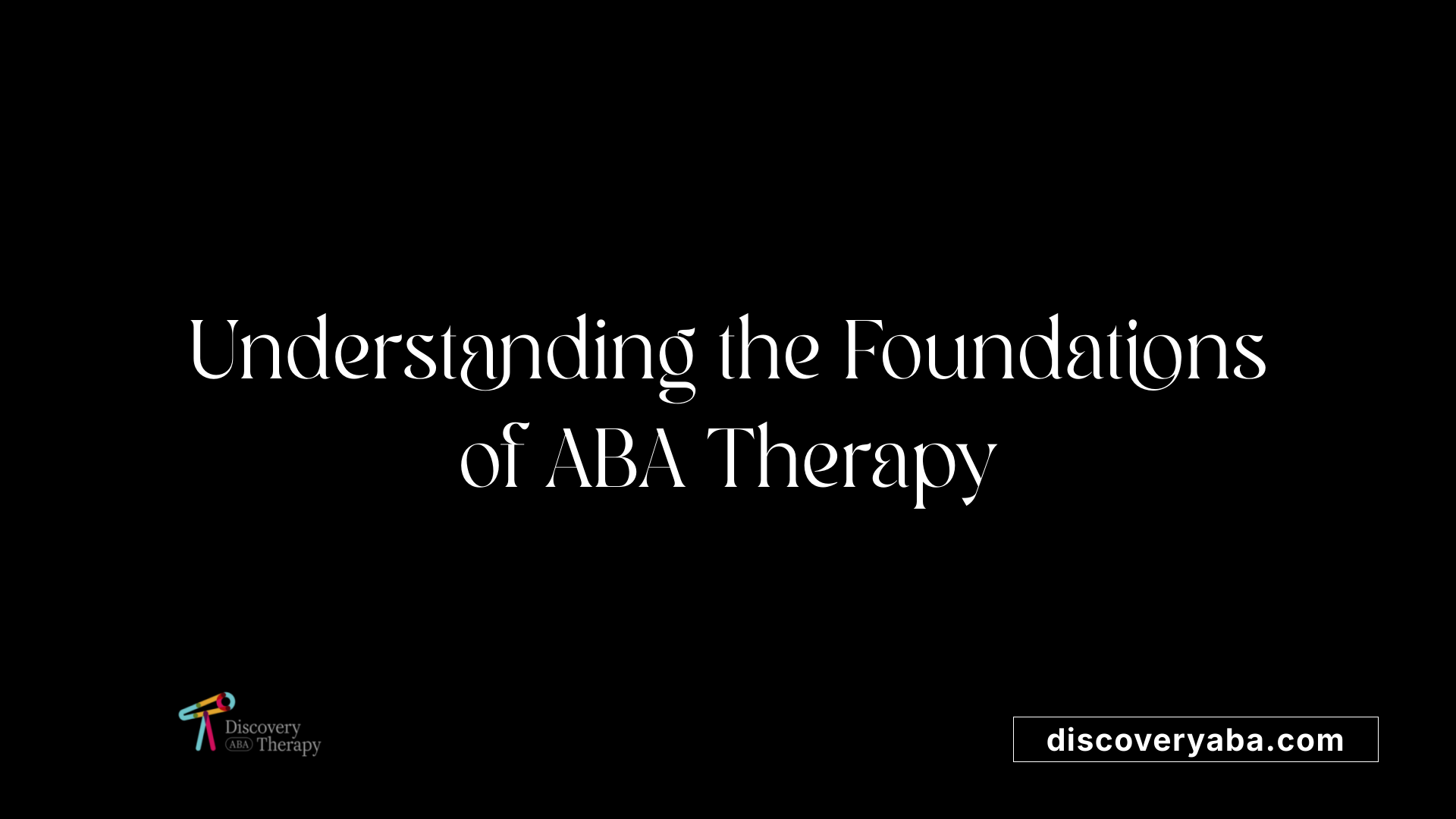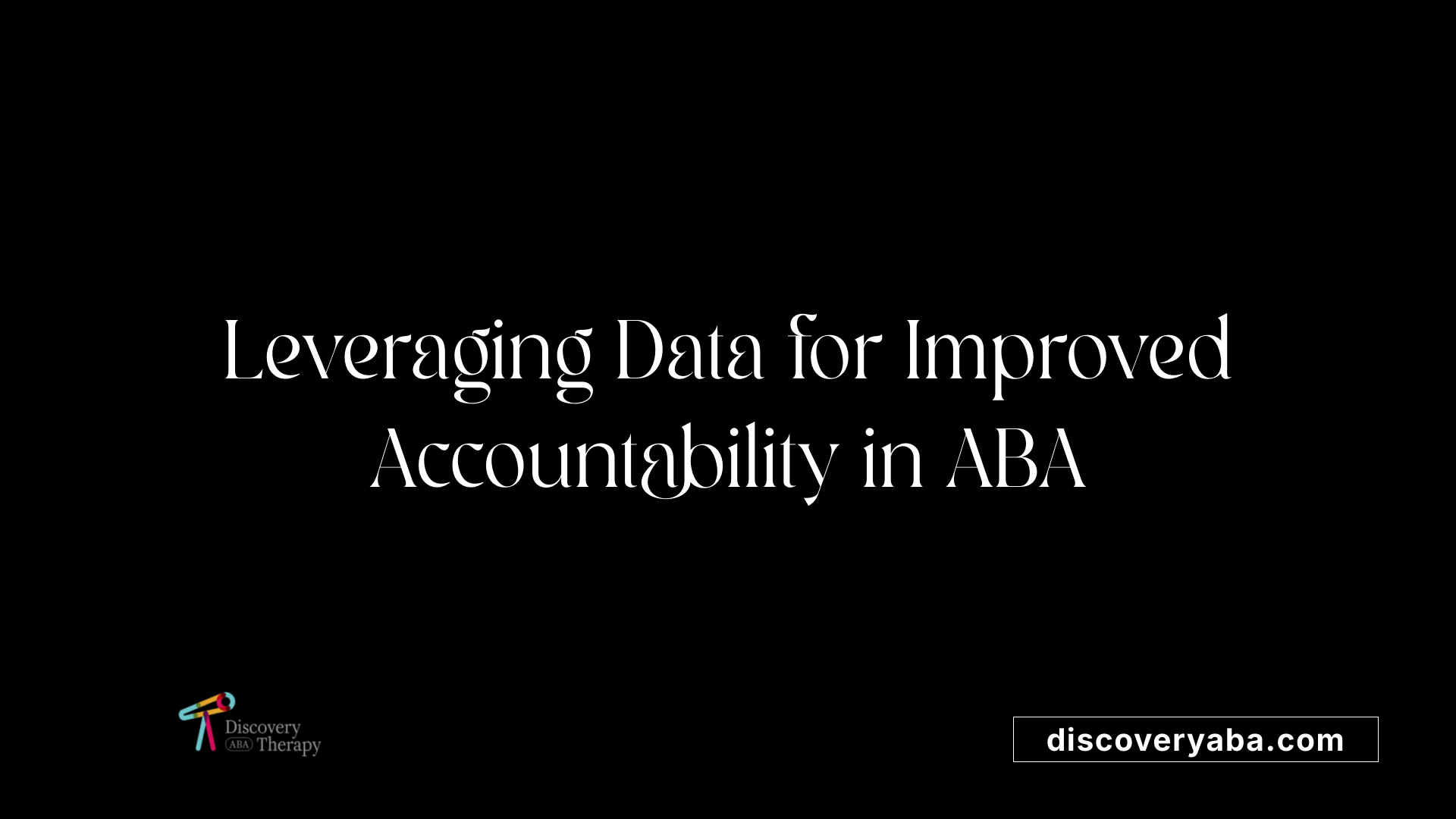How ABA Therapy Helps with Self-Monitoring and Accountability
Unpacking the Role of ABA Therapy in Building Self-Awareness and Responsibility

Understanding ABA Therapy's Impact
Applied Behavior Analysis (ABA) therapy has emerged as a transformative methodology, especially for individuals with Autism Spectrum Disorder (ASD), by enhancing self-monitoring and accountability. This comprehensive approach leverages the science of behavior to instill essential life skills, facilitating improved self-awareness and responsibility management in various contexts. Through its structured practices, ABA therapy not only aids in behavior modification but also empowers individuals to take charge of their personal growth and daily responsibilities.
What ABA Therapy and How It Supports Self-Monitoring and Accountability

About ABA (Applied Behavior Analysis)
ABA, or Applied Behavior Analysis, is a therapy grounded in the principles of behavior science. It examines how behaviors are influenced by environmental factors, enabling practitioners to devise tailored strategies to foster desirable behaviors and diminish problematic ones. This structured approach is particularly beneficial for individuals with autism, as it focuses on enhancing essential life skills. Through regular assessments and data collection, ABA helps learners monitor their progress and reinforces accountability in achieving behavioral goals.
Enhancing self-monitoring through ABA
Self-monitoring is a crucial aspect of ABA therapy. By implementing techniques like behavior contracts, clear expectations are established, promoting accountability and motivation. Learners are encouraged to track their behaviors, leading to improved attention and memory. Through direct observation and data collection, individuals are equipped to visualize their behaviors in real-time, enhancing self-awareness. Furthermore, self-monitoring techniques taught in ABA aid in recognizing emotional triggers and applying coping strategies, thereby fostering greater independence in managing one's behavior.
Teaching self-awareness and emotional regulation
Emotional regulation is a vital skill nurtured through ABA, wherein individuals learn to identify their emotional states and respond appropriately. Techniques such as Functional Communication Training improve communication skills, allowing better self-expression and self-regulation. The system recognizes successes through positive reinforcement, motivating individuals to maintain their behavioral gains. As a result, clients can not only manage their actions more effectively but also develop essential life skills that lead to increased self-sufficiency.
| Topic | Description | Benefits |
|---|---|---|
| Understanding ABA | Science of behavior and learning | Tailored strategies for behavior improvement |
| Self-Monitoring Techniques | Tracking and evaluating one's behavior | Enhances independence and responsibility |
| Emotional Regulation | Identifying and managing emotions | Fosters social and personal skills |
| Accountability Mechanisms | Regular assessments and feedback | Ensures progress and strategy adjustment |
Integrating Skill Development in Self-Monitoring and Accountability

How does ABA therapy contribute to skill development in self-monitoring and personal accountability?
ABA therapy plays a vital role in developing self-monitoring and personal accountability skills. It does this by incorporating several strategic approaches designed to foster independence and self-regulation.
Goal Setting: By establishing specific and measurable goals, individuals learn to focus their efforts. Goals provide a target to aim for, encouraging participants to evaluate their own progress systematically.
Empowering Independent Management of Behaviors: Through structured teaching methods, clients are guided to monitor their behaviors actively. This includes recognizing emotional triggers and employing coping strategies, allowing them to navigate challenges while managing their actions responsibly.
Tools for Tracking Progress: Utilizing effective self-monitoring techniques such as behavior contracts and consistent data collection fosters a sense of accountability. These tools help individuals observe their behaviors in real-time and recognize patterns that may require adjustments.
By integrating these components, ABA therapy encourages individuals to develop essential life skills. This self-monitoring approach not only enhances self-awareness but also promotes a long-term commitment to behavior change and personal development.
Principles of ABA Therapy in Fostering Accountability
What are the principles of ABA therapy that promote self-monitoring and accountability in individuals with Autism Spectrum Disorder (ASD)?
ABA therapy promotes self-monitoring and accountability in individuals with Autism Spectrum Disorder (ASD) through several essential principles. A foundational component is the A-B-C (Antecedent-Behavior-Consequence) model. This framework helps individuals dissect their behaviors by recognizing what occurs before (antecedent), the behavior itself, and what follows (consequence). By understanding these relationships, individuals gain insights into their actions and surroundings, facilitating effective self-assessment.
Self-assessment and self-reinforcement techniques
In addition to the A-B-C model, techniques like goal-setting and self-reinforcement are pivotal. Participants learn to set specific behavioral goals and monitor their progress toward achieving them. By employing self-reinforcement strategies, they reward themselves for reaching milestones, thereby enhancing self-awareness. This practice not only reinforces positive behaviors but also nurtures a sense of independence, empowering individuals to take charge of their growth.
Empowerment through tailored strategies
Empowerment is further reinforced through tailored strategies that identify individual triggers and limitations. Such methods allow individuals to adapt their approaches based on their unique needs, improving their self-regulation capabilities. For instance, techniques like Functional Communication Training (FCT) enhance communication, positioning individuals to express their emotions more effectively. This holistic focus on personalized interventions fosters accountability and enables individuals to manage their actions in various contexts.
| Principle | Description | Benefit |
|---|---|---|
| A-B-C Model | Analyzing antecedents, behaviors, and consequences to understand behavior dynamics. | Facilitates self-assessment. |
| Goal-setting & Self-reinforcement | Setting goals and reinforcing themselves for achievements. | Promotes independence and awareness. |
| Tailored Strategies | Customized interventions addressing personal triggers and limitations to enhance self-regulation. | Fosters empowerment and accountability. |
Through these principles, ABA therapy actively equips individuals with the tools needed for effective self-monitoring and accountability, significantly aiding those with ASD in managing their daily behaviors.
Expected Outcomes of ABA Therapy in Self-Monitoring and Accountability

What outcomes can be expected from ABA therapy in relation to self-monitoring and accountability?
Individuals undergoing ABA therapy can expect substantial improvements in self-monitoring and accountability. Improved self-regulation leads to greater independence in managing behaviors and daily responsibilities.
Improving Adaptive Behaviors
ABA focuses on cultivating adaptive behaviors through structured interventions. Participants learn to track their own actions, which fosters self-awareness and responsibility for personal behavior management. Research indicates that consistent engagement with ABA practices may yield clinically significant enhancements in adaptive behaviors, particularly among individuals starting with lower baseline levels. By setting individualized goals, individuals become motivated to achieve milestones that reflect their progress.
Enhancing Motivation Through Goal-Setting
Goal-setting plays a pivotal role in maintaining motivation. ABA therapy teaches participants to use tools like journals and digital trackers to set specific, measurable, achievable, relevant, and time-bound (SMART) goals. This systematic approach not only tracks progress but also cultivates accountability as individuals witness their advancement towards established objectives.
Utilizing Tools for Self-Monitoring
Effective self-monitoring tools are an integral part of the ABA framework. Participants learn to employ various techniques, such as behavior contracts, to define clear expectations and consequences. These contracts enhance motivation and reinforce accountability as individuals strive to meet outlined behavioral goals. Additionally, tools like Functional Communication Training (FCT) improve self-expression, enabling better self-regulation, a critical aspect of monitoring one’s behaviors.
Overview of Expected Outcomes
| Outcomes | Description | Benefits |
|---|---|---|
| Improved Adaptive Behaviors | Significant enhancements in adaptive behaviors through structured interventions. | Greater independence in daily activities |
| Enhanced Motivation | Increased motivation from establishing and achieving SMART goals, leading to self-accountability. | Fosters a responsible outlook |
| Effective Self-Monitoring | Use of behavior contracts and other tools for clear behavior tracking. | Supports behavior modification |
Overall, self-monitoring not only aids in behavior change but also encourages a profound sense of accountability. Participants are empowered to take charge of their social interactions and personal development.
Mechanisms of ABA in Personal Responsibility and Self-Regulation
How do the mechanisms of ABA therapy foster personal responsibility and self-regulation?
ABA therapy effectively promotes personal responsibility and self-regulation through a structured approach that emphasizes positive reinforcement and the understanding of behavioral frameworks.
Role of Positive Reinforcement
Positive reinforcement is a cornerstone of ABA therapy, encouraging individuals to engage in desirable behaviors by rewarding them when those behaviors occur. This leads to a connection between actions and positive outcomes, fostering a sense of accountability:
- When individuals succeed, they feel recognized and motivated to repeat those actions.
- Rewards can be verbal praise, tokens, or other incentives, reinforcing the desire to take ownership of their behavior.
Understanding Antecedents and Consequences
The A-B-C model (Antecedent-Behavior-Consequence) is central to ABA, helping individuals comprehend how their actions affect their surroundings. Breaking down behavior into three components clarifies:
- Antecedents: Triggers that precede behavior.
- Behavior: The actual response or action taken.
- Consequences: Results that follow, reinforcing or discouraging the behavior.
- This comprehension encourages self-reflection, allowing individuals to evaluate how their behaviors lead to specific outcomes, enhancing self-regulation capabilities.
Personalized Goal Setting
Personalized goals play a critical role in ABA. Treatment plans are tailored to match each individual's specific skills and needs, promoting engagement in their learning process.
- Setting targeted goals instills a sense of ownership, as individuals actively participate in defining their paths to success.
- Regular assessments and adjustments to these goals keep individuals accountable and responsive to their progress, further strengthening their self-regulation skills.
Incorporating these mechanisms not only equips individuals with practical skills for self-monitoring but also nurtures their ability to take responsibility for their actions and outcomes.
Behavior Contracts as a Tool for Accountability in ABA

Structured Approach Through Behavior Contracts
Behavior contracts serve as a powerful tool in Applied Behavior Analysis (ABA) therapy by outlining specific expectations and consequences related to behavior. These contracts establish a clear framework that helps individuals understand what is required of them. This structured approach fosters accountability, making it easier for both therapists and clients to monitor progress and adherence to goals.
Enhancing Motivation and Goal Achievement
In addition to accountability, behavior contracts enhance motivation. Individuals are more likely to engage in positive behaviors when they know that their actions are linked to agreed-upon rewards. This motivational aspect encourages individuals to strive for their goals, reinforcing positive changes in behavior.
Clear Expectations and Consequences
The clarity provided by behavior contracts is crucial for effective behavior management. By defining what behaviors are expected and the consequences for failing to meet those expectations, individuals have a solid understanding of the outcomes of their actions. This transparency supports the self-monitoring process and helps reinforce accountability within the ABA framework.
| Component | Description | Impact on ABA Practice |
|---|---|---|
| Structure | Outlines clear expectations and consequences | Enhances accountability and progress tracking |
| Motivation | Links actions to rewards | Encourages adherence to behavioral goals |
| Clarity and Transparency | Defines expected behaviors and consequences clearly | Supports self-monitoring and accountability |
Implementing Effective Self-Monitoring Techniques in ABA Supervision
ABA Supervision Courses
Courses focusing on self-monitoring techniques within ABA therapy supervision are designed to elevate both supervisor and supervisee performance. Participants engage deeply with the fundamentals of self-monitoring, including its pivotal role in fostering accountability and enhancing the overall therapeutic process.
Application of Self-Monitoring Tools
Throughout these courses, supervisors learn to implement various self-monitoring tools that integrate seamlessly into their daily practices. Techniques include monitoring progress through direct observation and the collection of data, allowing for real-time assessments and adjustments regarding behavioral goals. This practical training emphasizes how to set clear expectations by utilizing behavior contracts, thus creating an environment of structured accountability.
Enhancing Supervision Outcomes
The impact of employing self-monitoring strategies extends beyond individual supervisors to create a ripple effect that enhances supervision outcomes. By analyzing self-monitoring data collectively, supervisors can make informed decisions that lead to improved practices and ultimately drives better results for clients engaged in ABA therapy.
Data-Driven Decision Making in ABA for Accountability

Importance of Data Collection
In Applied Behavior Analysis (ABA), data collection is fundamental to enhancing accountability and monitoring progress effectively. Regular tracking of behavioral changes allows therapists to capture important information on an individual’s responses to interventions. By observing and documenting behaviors, practitioners can make informed decisions that are vital for successful outcomes.
Regular Assessments in ABA
Conducting frequent assessments is crucial in ABA therapy. These assessments not only measure progress but also ensure that the strategies implemented are yielding positive results. As behavioral data is collected over time, therapists can identify trends and patterns, ensuring the approach remains aligned with the individual’s specific needs and goals.
Adjusting Strategies Based on Progress
Adapting interventions based on collected data is a core component of ABA. When data indicates that progress is stagnating or negative, behavior analysts can modify strategies to better suit the individual's situation. This ongoing process not only promotes accountability but fosters a responsive therapeutic environment, encouraging individuals to take charge of their behavioral changes.
Application of ABA in Behavioral Sport Psychology
Role of goal-setting and self-monitoring for athletes
In the realm of sports, goal-setting becomes crucial for athletes to thrive. By setting specific, measurable goals, athletes can break down their training into manageable tasks. Self-monitoring plays a pivotal role here; athletes track their progress and reflect on their training outcomes, ensuring they remain aligned with their objectives.
Enhancing performance through accountability
Accountability in sports is essential for peak performance. Utilizing techniques from Applied Behavior Analysis (ABA), athletes learn to take responsibility for their actions. The reinforcement strategies inherent in ABA encourage athletes to recognize and repeat positive behaviors, promoting consistent performance across training sessions.
Applying ABA in sports context
ABA principles are adapted in the sports context to improve an athlete's self-monitoring skills. For instance, athletes are taught to collect data on their own practices, allowing coaches and athletes alike to analyze performance trends and adjust strategies accordingly. This structured approach not only fosters awareness but also enhances overall athletic development.
Family Involvement in Enhancing Self-Monitoring in ABA Therapy
Training caregivers for ABA implementation
Family involvement is pivotal in Applied Behavior Analysis (ABA) therapy. Caregivers undergo training to understand and implement ABA strategies effectively. This training equips them with the skills needed to reinforce self-monitoring techniques at home.
Supportive environment for accountability
A supportive home environment enhances accountability for individuals in ABA therapy. Caregivers learn to recognize behavioral cues and provide positive feedback. This support encourages individuals to track their own behaviors, promoting independence and self-regulation.
Managing daily responsibilities
By actively participating in therapy, caregivers help individuals apply self-monitoring strategies to manage daily tasks. This consistency fosters an understanding of responsibilities, supporting better emotional control and self-awareness. Involving families ensures that strategies are reinforced not just in therapy sessions, but throughout daily routines.
Adapting ABA for Individualized Skill Development
Customized ABA Programs
Applied Behavior Analysis (ABA) is not a one-size-fits-all solution; rather, it’s tailored to meet the unique needs of each individual. Each ABA program is designed based on a thorough assessment of specific skills and challenges. This customization ensures that interventions are effective and relevant to the individual's life circumstances.
Integrating Unique Skills and Needs
Effective ABA therapy takes into account a person's strengths and areas for growth. By integrating these unique traits into the learning process, practitioners develop targeted self-monitoring practices that resonate with the individual. For example, children with autism gain skills in emotional regulation and self-awareness through personalized strategies.
Targeted Self-Monitoring Practices
The incorporation of targeted self-monitoring techniques helps individuals track their behaviors and progress more effectively. By utilizing assessments and frequent data collection, therapists can adjust strategies in real-time, enhancing the accountability aspect of the ABA approach. This level of adaptation fosters a deeper understanding of one’s actions and promotes independence in managing personal goals.
The Transformative Power of ABA Therapy
ABA therapy offers a framework not only for understanding and modifying behaviors but also for instilling essential skills for self-monitoring and accountability. Its tailored, data-driven approach empowers individuals to become active participants in their behavior management, enabling sustainable growth and independence. As this approach continues to grow, the potential for individuals with autism to gain greater control over their lives and achieve personal goals expands, setting a solid foundation for lifelong learning and responsibility.
References
- Implementing ABA Strategies: Practical Tips for Everyday Life
- Self-Monitoring Strategies for Mid-Level and BCBA Supervisors
- Applied Behavior Analysis (ABA) | Autism Speaks
- [PDF] Applied Behavior Analysis Subspecialty Areas - BACB
- 7 Surprising Benefits of ABA Therapy for Kids You Need to Know
- Tackling Challenges from Executive Functioning to Emotional ...
- [PDF] Applied Behavior Analysis Treatment of Autism Spectrum Disorder:
- Applied Behavior Analysis (ABA) | Autism Speaks
- Self-Management Interventions
- Patient Outcomes After Applied Behavior Analysis for Autism ...
Find More Articles
Contact us
North Carolina, Tennessee, Nevada, New Jersey, Utah, Virginia
New Hampshire, Maine
Massachusetts, Indiana, Arizona, Georgia
.avif)





















































%2520(1).jpeg)































.jpeg)









